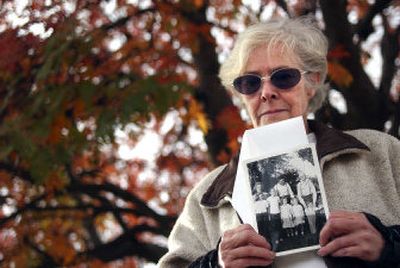Thieves steal part of man’s, woman’s personal life stories

The papers, fanned across a pedestal table in a grocery store cafeteria, were all Cilla Sears had left to document the last 45 years of her life.
There were yellowed letters of failed attempts to collect child support, thank-you notes, old bills and postcard-sized photographs of family members long dead that Sears, 57, stared at, speechless.
These things once had been packed away in boxes, several dozen, barely big enough for a pair of shoes or 10 reams of paper. Every year of her adult life, Sears had culled the artifacts of her existence, the restaurant napkins saved from memorable meals, the report cards of her three children, the elaborate doodles in colored pen.
The items meant nothing to the rest of the world, but they went a long way toward defining Sears, a woman three times divorced and a sturdy product of a tiny Montana logging town. A friend once told her she loved well but not wisely. The proof of the statement, along with evidence of Sears’ hopes and fears, was in the sundry items she had kept.
Sears boxed up her life’s details every 12 months, capping them with her tax information so they could be identified by date. The boxes all wound up in the attic of her Havana Street home, where Sears thought they’d stay forever – at least until several months ago when she discovered 30 of the boxes were missing.
“I don’t know why anyone would want these things,” Sears said, thumbing through a stack of truths many would be too modest to share. “I don’t care if you see them because who knows who’s seen them. I just want them back. It’s my life.”
Sears’ remarks resonated with Beth Beecroft, who happened to place an ad for a missing box in the lost-and-found column of The Spokesman-Review on the same day as Sears.
Beecroft’s was a military trunk, a white coffee-table-sized rectangle about 2 feet deep that belonged to a family friend, Frank Collins, who had died seven years ago at age 93.
Collins too, had trusted his life story to boxes. In them was the evidence of a young man who had sneaked off to enlist in the Army at age 17 only to be caught by his mother and brought home. He enlisted again at 18 and remained for 39 years.
Beecroft had been working with Collins’ estate to find appropriate homes for her friend’s belongings, such as a World War I-era gas mask bearing a soldier’s name. She had yet to try the two latches and round, flat lock on the trunk’s lid, so she doesn’t know the box’s contents, though she’s certain it contains a history lesson.
Collins had an unusual life that included a role in a 1924 U.S. government expedition to locate a white Indian tribe allegedly discovered during the digging of the Panama Canal. The explorers were speared, beheaded and poisoned. Collins was one of only a few who survived. As a master sergeant in World War II, he escorted Gens. George Patton and Omar Bradley around the battlefield.
Beecroft has been determined to keep Collins’ history alive. That mission took a blow when the trunk was stolen from a garage.
“The trunk could have belonged to anybody’s father or grandfather,” she said. “The trunk tells the story.”
Meanwhile, Sears waits on the western edge of Spokane Valley for someone to answer her ad. She examines the photos of her lost family, of her Aunt Mayme and her Uncle “Big Jim,” of a neighbor woman in Libby who used to have Sears over on Saturdays for pigs in a blanket. But the photos are small, like monochrome fragments from a shattered mirror, unable to show the big picture.